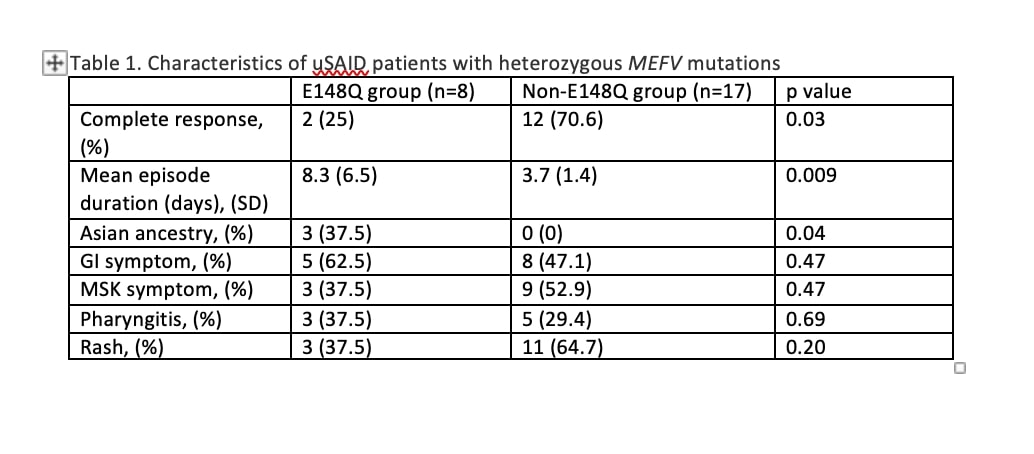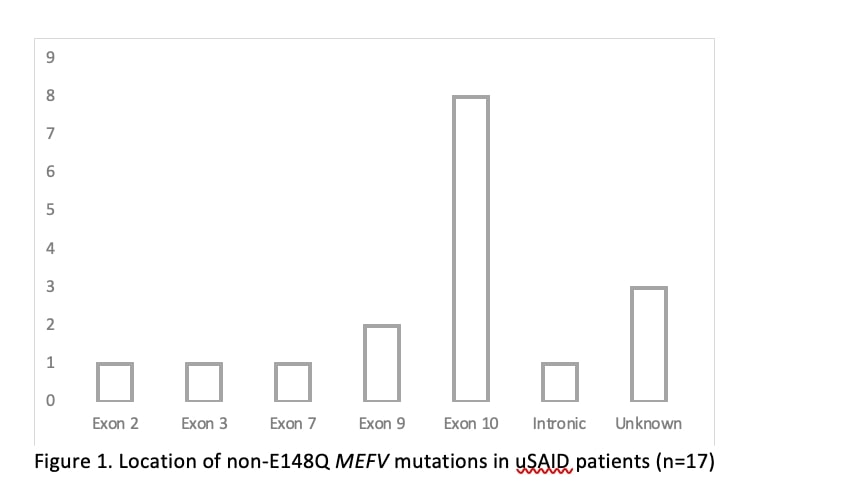Session Information
Date: Tuesday, November 9, 2021
Title: Pediatric Rheumatology – Clinical Poster III: Miscellaneous Rheumatic Disease (1614–1644)
Session Type: Poster Session D
Session Time: 8:30AM-10:30AM
Background/Purpose: Undifferentiated systemic autoinflammatory diseases (uSAID) are diverse syndromes characterized by acute flares of fever and inflammation, which do not meet clinical criteria for known disorders like Familial Mediterranean Fever (FMF). As part of the uSAID workup, many patients undergo genetic testing, sometimes revealing variants of uncertain significance in genes associated with autoinflammation. E148Q is a common polymorphism in exon 2 of the MEFV gene, which is not thought to be a disease-causing variant for FMF. The contribution of E148Q mutations in patients with uSAID is poorly understood, and it is unknown how it may respond to empiric treatment with colchicine, which is first line for FMF. To compare the clinical characteristics and colchicine response of children with uSAID identified to have E148Q vs non-E148Q mutations in the MEFV gene.
Methods: Children with uSAID ≤18 years old at initial evaluation seen at a single-center during 2000-2019 were included if they received ≥3 months of colchicine therapy and carried at least one MEFV mutation but did not meet clinical criteria for FMF (n = 25). Data on demographics, clinical features, laboratory/genetic studies, and treatment responses were collected.
Results: In our cohort of 25 children with uSAID and MEFV mutations, 8 (32%) were heterozygous for E148Q mutations. Half of these patients also carried another non- exon 10 MEFV mutation (2x 369S, 1x L110P, 1x I591T). Distribution of the remaining variants on MEFV gene is shown in Figure 1. Clinical features of children with E148Q vs. other MEFV mutations are shown in Table 1. Asian ancestry was seen in 3/8 (37%) children with E148Q mutations and in no child with other MEFV mutations. Children with E148Q mutations had longer length of febrile episodes (8.3±6.5 vs. 3.4±1.4 days; p=0.009) and were less likely to have a full response to colchicine (25% vs 70%; p = 0.03).
Conclusion: In our cohort of children with uSAID and MEFV mutations, E148Q was associated with longer duration of fever flares and a reduced colchicine response. Larger studies will be helpful in elucidating the unique role of these mutations in autoinflammation.
 Table 1. Characteristics of uSAID patients with heterozygous MEFV mutations
Table 1. Characteristics of uSAID patients with heterozygous MEFV mutations
 Figure 1. Location of non-E148Q MEFV mutations in uSAID patients (n=17)
Figure 1. Location of non-E148Q MEFV mutations in uSAID patients (n=17)
To cite this abstract in AMA style:
Egeli B, Wobma H, Correia Marques M, Hausmann J, Dedeoglu F. Clinical Features and Colchicine Response in Patients with Undifferentiated Systemic Autoinflammatory Disease Carrying E148Q vs. Other MEFV Mutations [abstract]. Arthritis Rheumatol. 2021; 73 (suppl 9). https://acrabstracts.org/abstract/clinical-features-and-colchicine-response-in-patients-with-undifferentiated-systemic-autoinflammatory-disease-carrying-e148q-vs-other-mefv-mutations/. Accessed .« Back to ACR Convergence 2021
ACR Meeting Abstracts - https://acrabstracts.org/abstract/clinical-features-and-colchicine-response-in-patients-with-undifferentiated-systemic-autoinflammatory-disease-carrying-e148q-vs-other-mefv-mutations/
